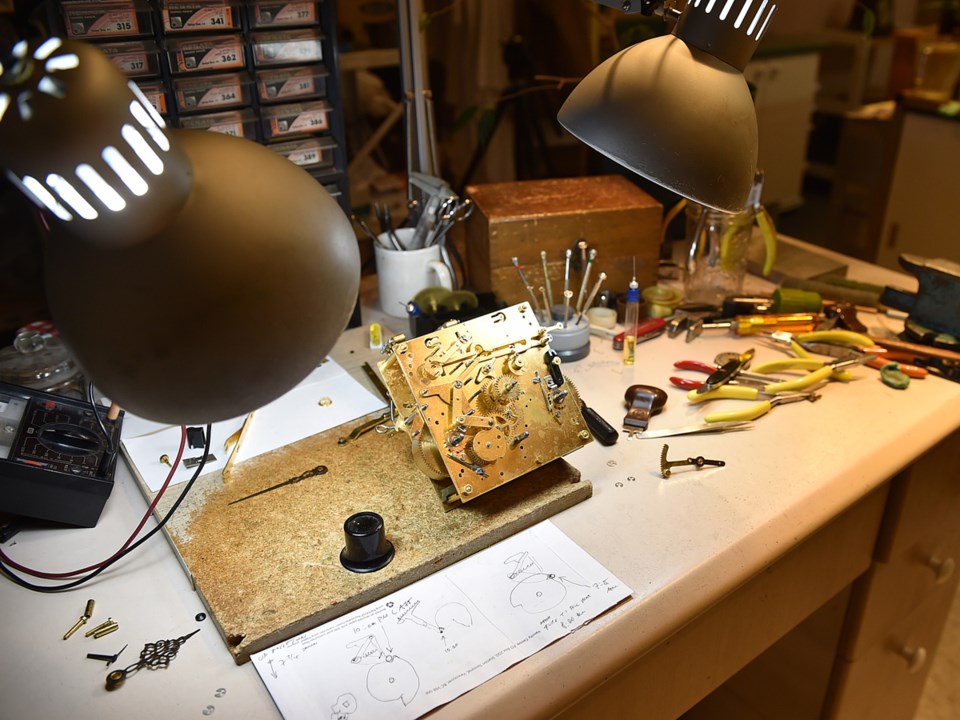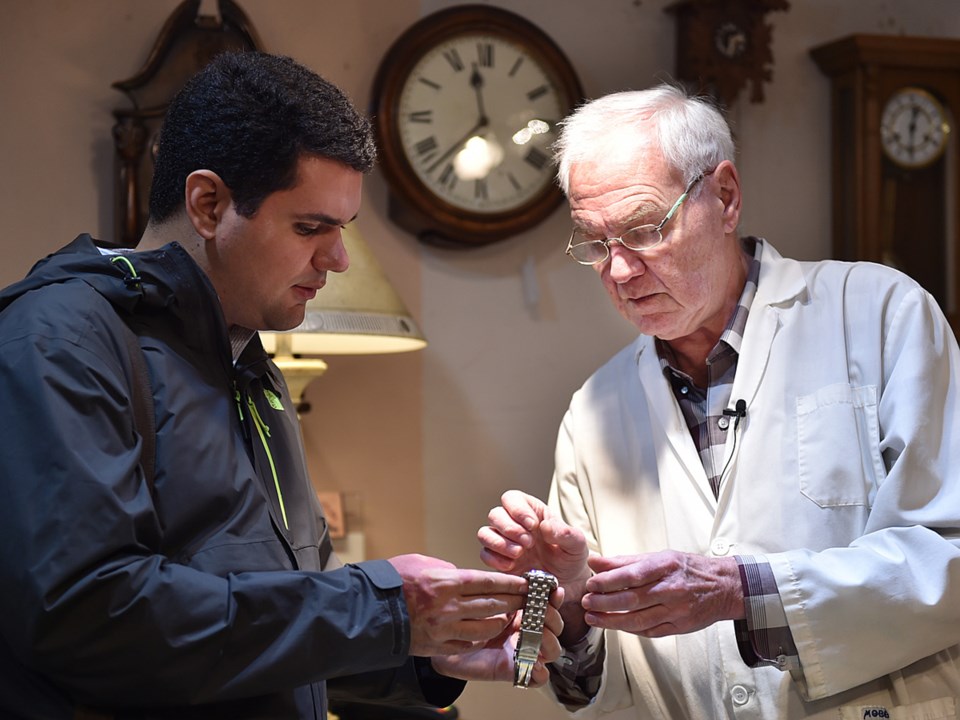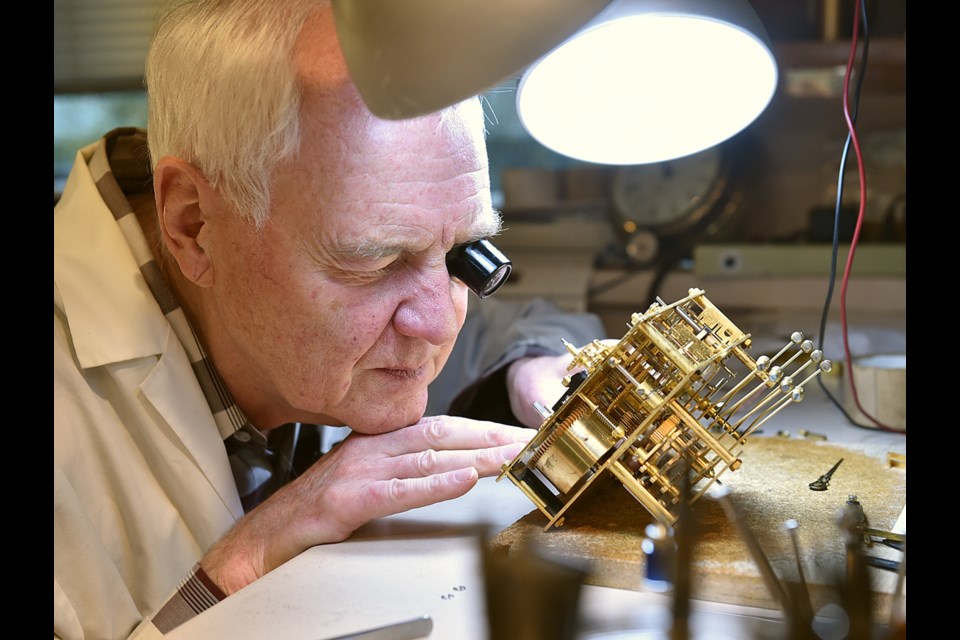Friedrich “Fritz” Irrgang eschews advertising, doesn’t have a website and maintains virtually no online presence.
Save for a small sandwich board on Burrard and Sixth Avenue, you’d be hard-pressed to know that Western Watch & Clock Repairs even existed.
An unorthodox business model for some, though Irrgang’s appeal is seemingly timeless.
Irrgang is one of a small handful of watchmakers and master clocksmiths left in Vancouver. He’s been at it on Burrard for 20 years, and for a decade before that downtown.
He’s weathered the cellphone storm, worked on clocks from the 1700s and has fixed thousands of timepieces since receiving his master watchmaker designation in 1963.

He even sets aside one day a week for house calls.
“When a customer comes in and brings me something that they’ve had in the family for a long time and it has quit working, it gives me great satisfaction to restore it to its former glory and make sure that clock or watch is working again,” Irrgang said.
Irrgang’s rationale for no advertising or website is as practical as he is personable.
Timepiece repair happens on an as-needed basis that can span anywhere from 10 to 50 years. His work does all the advertising for him.
“If the customer leaves here happy and is satisfied, he will refer to me his friends and business associates and I’m getting a new client out of that. So if I do a good job, I get a new customer,” Irrgang said.
Irrgang’s shop is like a collage of snapshots from different eras. There are watches from over the last century, a clock from 1820 and a long case clock — commonly referred to as a grandfather clock — from sometime in the 1700s. With no reference point for how to fix the 300-year-old timepiece, Irrgang stripped the casing from the clock and simply watches its machinations to understand it functions and faults.
That level of mindfulness demonstrates the number one rule in watchmaking: all good things come to those who wait.
“I was rather impatient when I was younger,” Irrgang said. “But as the years passed by I realized I had to become more and more patient to do this kind of work. So it worked out. Patience is definitely the number one thing.”
Vienna calling
Watchmaking found Irrgang, rather than the other way around. A native of Vienna, Austria, the 72-year-old wanted to be gardener in his teenage years. A family friend who recently retired from the city’s watchmaking school mentioned the shortage of watchmakers in the marketplace, and the plan was hatched.
Irrgang spent three years on the practical side of his studies, followed by a year-long masterclass. He had to build timepieces from scratch in each of those first three years: a wall regulator clock, which is characterized by an elongated cabinet and its placement on a wall, a pocket watch and then a wrist watch.
Outside of his formal training, Irrgang’s skillset is all over the map: he’s a metallurgist, drafter, carver and part-time public relations rep.
“You have to be able to listen to people. Listening is very important,” he said.

Time marches on
Arriving in Vancouver in 1972, Irrgang spent his first decade in Canada selling jewelry and packaging supplies. He got back into watchmaking in 1982 at his former location in the Vancouver Block building.
Irrgang said there was at least three dozen watchmakers in Vancouver at that time. Now, he reckons there’s less than 10 and he knows most of them. Quartz watches were the game changer on that front: they replaced wind-up watches and previous battery types, lessening the need for repair.
Cellphone technology had a minor impact on his business when camera phones became ubiquitous a decade ago, though the trend has travelled full circle: younger people are all about wristwatches, older generations take pride in fixing and preserving antique clocks that have been in their families for generations.
“A watch is something very personal. It’s like clothing: you wear it on your body, it’s a statement of fashion, it’s something that is with you all day long,” he said. “And it’s a lot easier to lift your arm and take a look to see what time it is rather than digging out your cellphone.”
Curiously enough, Irrgang isn’t wearing a watch when visited by the Courier. He only owns two watches, because he’s “surrounded by watches and clocks.”
Irrgang will be 73 in early December. He’s pondered retirement, but his customers are having none of it. About the only trace of Irrgang’s online existence is found in roughly a dozen Yelp reviews, all of which are overwhelmingly positive.
“The first question [customers] always ask is, ‘Are you still there?’ when my clients phone me. The second thing they say is, ‘Please don’t retire,’ so they put a big guilt trip on me,” Irrgang joked. “So I just keep going.”



